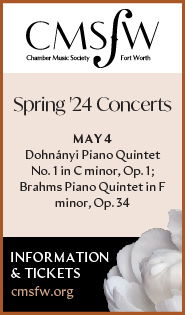Doric String Quartet brings masterful playing to Dallas

The Doric String Quartet presented a sublime display of chamber music principles in a night of masterful playing and artful interpretation Monday night at Southern Methodist University. Presented by the Dallas Chamber Music Society, the program featured quartets by Haydn, Britten, and Jean Sibelius and the Doric members delivered expressive yet technically precise performances.
Haydn’s Quartet in E-flat Major, Op. 33, no. 2, opened the program at Caruth Auditorium. The work was nicknamed “The Joke” for its teasing finale, where the listener is made to think the piece is over when it really isn’t. The Doric Quartet’s sound here was appropriately lean and light, with fluid and expansive phrasing in the opening Allegro. Where many quartets push forward momentum into heavy-handedness, this troupe managed a delicate exchange between the voices that was nimble and energized.
First violinist Alex Redington gave a buoyant touch to the rhythmic themes of the second movement. The comedic finale of the fourth movement was handled expertly and with just the right amount of wit.
Britten’s Quartet No. 3, his last completed work, is a paradox of form, structure, and traditional chamber textures set over five movements. The work was given an extra layer of authenticity and care with violist Hélène Clément playing on the composer’s own instrument. It opened with a mesmerizing shifting of focus. John Myerscough’s cello was affectionately dark against the dissonant bite of the rest of the ensemble in his execution of the recurring descending motive that characterizes this movement.
Redington’s high, wrenching solo in the third movement was performed with a brilliant tone and seamless legato. The effect here, with sparse accompaniment from the other three instruments, was austere and mysterious, performed with astute musicality and perfect balance.
That music was juxtaposed nicely against the startlingly quick Burlesque and the haunting slow finale, “La Serenissima,” which instructs the violist to play on the wrong side of the bridge. The quartet culminates in a rather plaintive mood. Here, however, the Quartet provided appropriate heft while still conveying the nuances of Britten’s score with a presence that was clear and resonant.
The second half of the program was devoted entirely to Sibelius’ Quartet in D minor “Voces intimae”. Opening with an exchange between the violin and cello on a somber melody, the piece very quickly establishes an introspective mood. Here, again, the ensemble was still appropriately rich and full-bodied while managing to capture the hushed depth of the score. The players’ lines were clean and elegant as they spun out the elongated swathes of step-wise motion in the main theme.
Equally supple and precise in execution, the second movement was marked by a brilliant vivace with scurrying themes. The central slow movement is the quartet’s emotional center and the source of its name (over three muted chords, the composer wrote “voces intimae” in his manuscript). The troupe sensitively conveyed the composer’s characteristic silvery gleam over the lush, romantic lines of the movement before moving into the final Allegro. Their driving momentum and robust fortes provided an energizing finish that punctuated an exceptionally fine evening of music-making.
The Dallas Chamber Music Society will present the Jerusalem String Quartet 7:30 p.m. March 23 in SMU’s Caruth Auditorium. dallaschambermusicsociety.com/


